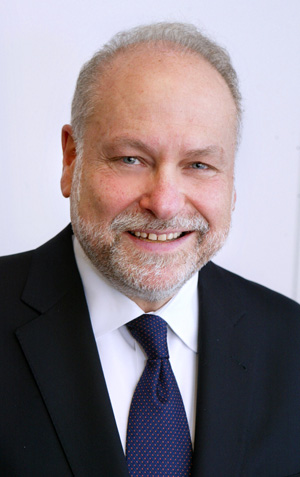Thermodynamic and Kinetic Models of the Emergence of Biological Homochirality
Lecture by Pablo G. Debenedetti
Dean for Research
Class of 1950 Professor in Engineering and Applied Science
Department of Chemical and Biological Engineering
Princeton University
Tuesday, May 13, 2014
Lecture at 4:00 PM
1610 Engineering Hall
Reception at 3:30 p.m. Engineering Hall Lobby
Chiral asymmetry choices exhibited by molecules present in living organisms constitute a scientifically challenging set of observations. Such geometric preferences favoring one enantiomer over its mirror image are obvious in the structures of amino acids, sugars, and the biopolymers that they form. These facts generate fundamental questions about how those chiral asymmetries arose spontaneously in the terrestrial biosphere. We have formulated thermodynamic and kinetic models of chiral amplification that provide insight into possible scenarios for the emergence of chiral imbalance in the prebiotic world.
The thermodynamic model involves two enantiomeric forms of a chiral molecule and a non-chiral liquid solvent. Over broad ranges of initial composition, thermodynamic equilibrium results in liquid-phase chiral amplification, in agreement with experimental observations.
The kinetic model involves autocatalysis, inhibition, and molecular diffusion. Numerical solution identifies two regimes. In one, the system evolves towards a mixture containing equal amounts of the two chiral enantiomers. In the symmetry-broken regime, the system evolves spontaneously towards large excess of one or the other chiral enantiomers.
Results will also be presented on a kinetic Monte Carlo model that reproduces experimental observations on attrition-enhanced chiral symmetry breaking, of relevance to the separation of chiral compounds in the pharmaceutical industry.
 |
Pablo G. Debenedetti is the Class of 1950 Professor in Engineering and Applied Science, Professor of Chemical and Biological Engineering, and the Dean for Research at Princeton University.
He grew up in Argentina, receiving his undergraduate education at the University of Buenos Aires, where he obtained his B.S. degree in Chemical Engineering in 1978. Between 1978 and 1980 he worked as a process development engineer at the electrochemical company De Nora, Impianti Elettrochimici in Milan, Italy. He came to the U.S. in 1980, and he received his MS (1981) and PhD (1985) degrees in Chemical Engineering from the Massachusetts Institute of Technology.
Since 1985 he has been a faculty member at Princeton University, where, prior to becoming Dean for Research, he served as Chair of the Chemical Engineering department (1996-2004), and Vice Dean of the School of Engineering and Applied Science (2008-2013).
His research interests include the thermodynamics and statistical mechanics of liquids and glasses; water and aqueous solutions; protein thermodynamics; nucleation; metastability; and the origin of biological homochirality. He is the author of one book, Metastable Liquids, and more than 200 scientific articles. Metastable Liquids was named "best scholarly book in chemistry" by the Association of American Publishers (1997).
Debenedetti's professional honors include the National Science Foundation's Presidential Young Investigator Award (1987), the Camille and Henry Dreyfus Teacher-Scholar Award (1989), a Guggenheim Memorial Foundation Fellowship (1991), the Professional Progress (1997) and Walker (2008) Awards from the American Institute of Chemical Engineers, the John M. Prausnitz Award in Applied Chemical Thermodynamics (2001), and the Joel Henry Hildebrand Award in the Theoretical and Experimental Chemistry of Liquids from the American Chemical Society (2008). He received the Distinguished Teacher Award from Princeton's School of Engineering (2008), and the President's Award for Distinguished Teaching (2008), Princeton's highest distinction for teaching. In 2008 Debenedetti was named one of 100 Chemical Engineers of the Modern Era by the American Institute of Chemical Engineers.
He is a member of the National Academy of Engineering (2000), the American Academy of Arts and Sciences (2008), and the National Academy of Sciences (2012), and is a fellow of the American Association for the Advancement of Science and the American Institute of Chemical Engineers.
Debenedetti is a Consulting Editor for Thermodynamics with the AIChE Journal (2012- present), where he previously served as Associate Editor for Perspective articles (2006-2010). He is a member of the Editorial Board of the Proceedings of the National Academy of Sciences (2013-2015), and previously served on the Editorial Boards of the Journal of Supercritical Fluids (1988-2004), the Journal of Chemical Engineering Data (1996-1998), Chemical Engineering Education (2000-2009), Industrial and Engineering Chemistry Research (2001-2004), and the Journal of Chemical Physics (2006-2009). He was a member (2006-2012) and co-chair (2011-2013) of the National Academies' Board on Chemical Sciences and Technology, and is or has been a member of the Advisory Councils of the Chemical Engineering Departments at Columbia (2010 – present), Pennsylvania State University (2006-2010), City College of CUNY (2004 – present), Cornell (1999-2005), and MIT (1997-2005).
